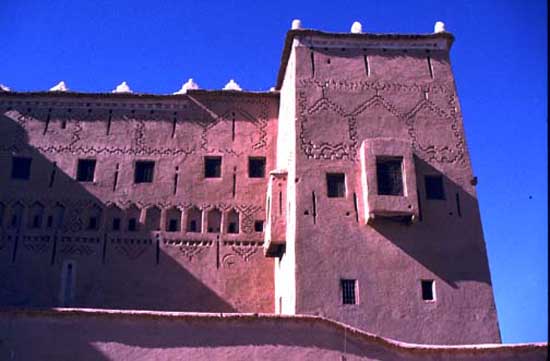
Morocco RPCV Ruth Ann Skaff works with Arab-American Anti-Discrimination Committee
Arab-Americans' successful assimilation makes them difficult to count
By KIM COBB
Copyright 2003 Houston Chronicle
Ruth Ann Skaff moved to Houston as a child in 1959 when her father took over as pastor of St. George Antiochan Orthodox Church. Her grandparents had immigrated to the United States from small villages in Lebanon in the 1880s.
Her family and friends didn't think of themselves as "Arab-Americans" then, she said, but were aware of their Arab heritage.
Skaff graduated from the University of Texas in 1972 and spent the next decade in the Peace Corps. Returning to Houston in 1983, she was at first puzzled by the formation of the Arab-American Anti-Discrimination Committee, but would later serve as the organization's Texas coordinator.
"And then they showed me these despicable editorial cartoons, and the astonishing and insidious blatant defamation of Arab people," Skaff said. "That's when I made the decision to self-identify as an Arab-American."
Skaff, now working in Washington as a fund-raiser for an Arab-American social services organization, says she understands why the Census Bureau undercounts the Arab population. There is disagreement, even among Arabs, as to who should be considered "Arab," and there is a reluctance among many to embrace the label, she said.
"People who are third and fourth and fifth generation, people who have grown up in this country, people my age, have been bombarded with the (negative) image of the Arab," Skaff said. "And a lot of my friends will look me dead in the eye and say, `I'm not of Arab descent.'
"They'll say, `I'm Phoenician,' or whatever," Skaff said. "They're ashamed, because of the vicious stereotyping that occurs."
This is the first time the Census Bureau has issued a report focusing on the Arab-American population. The question on ancestry or ethnic heritage went out on the 2000 Census long form to one out of every six households, but 19 percent of the respondents provided no response to the ancestry question.
The Census Bureau reports 1.25 million Americans claimed Arab ancestry in the 2000 Census -- an increase of about 40 percent over 1990. But the Arab American Institute Foundation in Washington, D.C., a partner with the Census Bureau, estimates the national population of Arab-Americans to be more than 3.5 million.
The census acknowledges 18 countries as Arab, but the Arab American Institute Foundation also recognizes Arabic-speaking people who call themselves Assyrian or Chaldean, Somali or Sudanese.
The number of Texans who claim Arab ancestry has more than doubled since the census first measured ethnic origin in 1980, and AAIF studies show that Texas is one of the most popular destinations for new arrivals from the Persian Gulf region.
"Just the fact that this particular report shows a number in the range of 11,000 is indicative of the underestimation of the (Houston Arab) community," said Houston attorney DeeDee Baba, 29. "There are that many in Sugar Land, alone, right?"
As coordinator of the local Arab American Leadership Council, Baba sees that low number as evidence that Houston residents of Arab descent have made themselves easy to overlook, and need to be more vocal.
"Sometimes, in the current political climate, maybe there are not a lot of people who are proud to be Arab-Americans," Baba said. "Sometimes, if you just kind of do your own thing, you can avoid the stigma. I don't know if that's been the trend for 10 years, but post-9/11 may be a factor to consider."
But Fustok, who was born in Syria, suggests different motivation for the low profile.
"Most Arab-Americans, when they come here, they want to fit," Fustok said. "They don't see themselves as different, and they see themselves as guests of a country. As guests, they try to make as few waves as possible."
Descendants of the first major wave of Arab immigration to the United States (1880-1920) are now well into their fifth generation, and more recent Arab immigration has averaged more than 25,000 annually in the past decade alone.
Arab immigrants arriving in Houston in recent decades tend to be highly educated, with incomes higher than the average American -- good predictors of future political involvement, according to Rice University sociologist Stephen Klineberg.
"This is a brain drain of monumental proportions coming from these countries," Klineberg said. "Their children are going to be dynamite."
